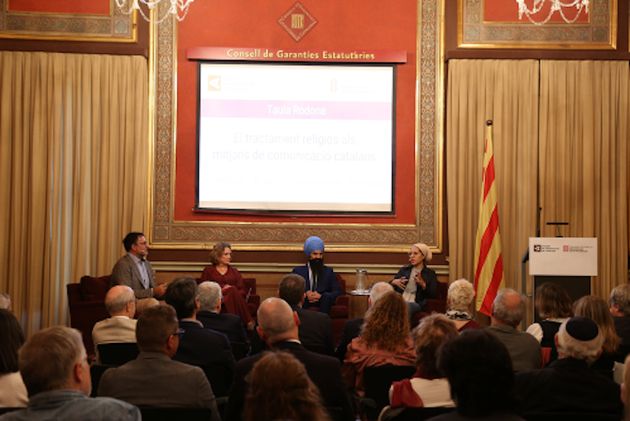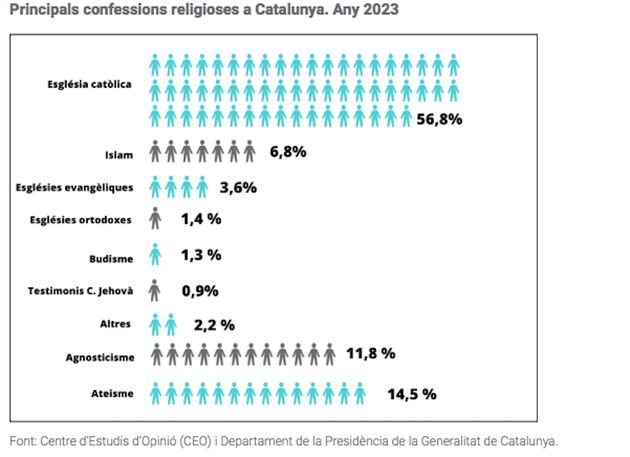The official report includes a guide with the most common mistakes and proposals to avoid them.
![Photo: [link]David Vives[/link], Unsplash CC0.](https://cms.evangelicalfocus.com/upload/imagenes/654b999aae1c4_DavidVives.jpg) Photo: [link]David Vives[/link], Unsplash CC0.
Photo: [link]David Vives[/link], Unsplash CC0.
The Audiovisual Council of Catalonia (CAC) and the Directorate General of Religious Affairs have published the 73-page document Recommendations on the media coverage of religious facts, which explores the plural religious reality of the region and offers a reflection on how to report it.
According to the president of the CAC, Xevi Xirgo, it is a "simple but exhaustive" guide, which aims to facilitate the work of journalists in a new information scenario, in which "the majority of specialised writers [in the field of religion] in newsrooms and the media have disappeared".
The general director of Religious Affairs of Catalonia, Carles Armengol, also took part in the presentation of the document, pointing out that "religious information is not an easy field", especially at a time when "the very concept of religion, the meaning and significance of religions" is changing.
"It is a question of fostering respect for the faiths, and avoiding to reduce everything to the Roman Catholic Church", added Armengol, who also said that "it is necessary to think more about cultural information rather than political information" when it comes to dealing with religion.

Part of the report includes new data on the diversity of the religious network in Catalonia, with an update of the religious map.
According to this tool, the places of worship have increased compared to the last time it was updated, in 2021, going from 7,251 to 7,291, although they are still less than the 8,165 registered in 2020.
The number of evangelical churches in Catalonia has increased from 788 to 818, being "the religious tradition that has had a more prominent growth in the last two decades, and the one that has created more places of worship during all these years", they explained.
In another of its statistical documents, the barometer of religiosity, the institution speaks of 7% of the Catalan population identifying as Protestant or Evangelical.
However, the document published now shows that 3.6% of Catalans define themselves as evangelical, behind Roman Catholicism (56.8%) and Islam (6.8%).
The Roman Catholic Church continues to lose parishes, from 5,802 to 5,795, and Islam continues to be the third faith with the most places of worship, 304, ahead of Jehovah's Witnesses (112) and Buddhists (65).

The guide analyses 12 of the 15 faiths with presence in Catalonia, focusing on the main ones: Buddhists, Adventists, Catholics, Mormons, Evangelicals, Orthodox, Bahá'í, Hindus, Muslims, Jews, Sikhs and Jehovah's Witnesses.
The aim, Xirgo explained, is to reflect "a moment in which religion still fills a social space and we coexist with many religions".
The regional government's secretary for media and diffusion, Oriol Duran, stressed the importance of valuing and respecting this pluralism "at a time when extremism and polarisation are fuelling hatred", and called on journalists to be "especially careful to avoid misunderstandings and to encourage coverage that avoids hatred and discrimination".
The report also shows that 66.9% of the Catalan population considers it " quite or very important" to have some knowledge of religious diversity.
The guide also includes a series of common mistakes when reporting on religious diversity and the religious phenomenon, and makes several proposals for improvement.
Specifically, it calls for caution when talking about religious fundamentalism, avoiding simplifications and clichés, and taking into account the specific characteristics of each faith and its social work.
For example, when talking about opening a church in a neighbourhood, which, they say, is typical of Christian traditions, while the Mormons of the Church of Jesus Christ of Latter-day Saints use the term "chapels".
They also make the distinction between islamism, which they say is a politico-religious movement, and islam, as a religious denomination.
Regarding evangelical communities, they point out that, unlike the Roman Catholic Church, it is better to speak of "evangelical communities", and that they do not have "a common organisation", nor is there "the centralisation" that exists in the Roman Catholic Church.
[donate]

Las opiniones vertidas por nuestros colaboradores se realizan a nivel personal, pudiendo coincidir o no con la postura de la dirección de Protestante Digital.
Si quieres comentar o